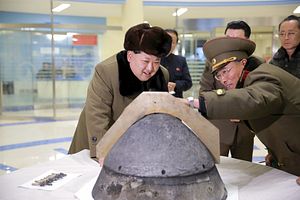When it comes to the global effort to denuclearize North Korea, 2016 has been a year of bleak and uncommonly frank assessments of the likelihood of success.
In October, just weeks after Pyongyang conducted its second successful nuclear test of the year, U.S. Director of National Intelligence James Clapper admitted at an event host by the Council on Foreign Relations that getting North Korea to give up its nuclear weapons was “probably a lost cause.”
“They are not going to do that,” Clapper said. “That is their ticket to survival. And I got a good taste of that when I was there about how the world looks from their vantage. And they are under siege and they are very paranoid.”
The comments, made in the context of a question about the effectiveness of disarmament talks, deviated wildly from the White House script, forcing State Department spokesman John Kirby to insist “nothing’s changed” regarding Washington’s goal of achieving a nuclear-free Korean Peninsula.
This week, the chorus added one more pessimistic voice: Thae Yong-ho, the high-ranking North Korean diplomat who in August defected from the London embassy to South Korea. In his first public remarks since arriving in Seoul, the diplomat-turned-regime critic said Tuesday that Pyongyang would never relinquish its nuclear weapons as long as leader Kim Jong-un remained in power.
The regime, which U.S. officials believe already has a dozen or more nuclear devices as well as the ability to mount a warhead on a missile, would not be swayed even if offered “$1 trillion or $10 trillion in rewards,” Thae said.
The former deputy ambassador to the U.K. said Pyongyang was committed to having nuclear arms for their own sake — not as a bargaining chip to extract aid and other concessions.
The remarks were a sobering comment on the denuclearization efforts of the United States, China, and South Korea, the main players working to denuclearize the Korean Peninsula. Washington and Seoul, both of which are on the verge of leadership changes, have focused mostly on forcing change through sanctions, rejecting the possibility of talks until Pyongyang indicates seriousness about disarmament. Beijing, which has signed off on multiple rounds of UN sanctions against its ally, has instead advocated for the restart of the Six Party Talks. The negotiations, which also involve Russia and Japan, have been suspended since 2009.
In the meantime, North Korea has made increasingly rapid progress in its development of nuclear weapons, helping solidify a growing consensus that its unmovable goal is to be a fully fledged nuclear power. This year, Pyongyang carried out its fourth and fifth nuclear tests, achieving an unprecedented two successful detentions just months apart. Some analysts, such Bulletin of the Atomic Scientists Editor in Chief John Mecklin, believe North Korea could have a functioning nuclear-armed intercontinental ballistic missile within a decade.
“I’ve said it countless times for years now. Denuclearization of North Korea would constitute revolutionary change,” Daniel Pinkston, a Troy University lecturer and former Korean linguist with the U.S. Air Force, told The Diplomat.
“Songun [‘Military First’] Korea sees talks as a mechanism to be recognized as a ‘nuclear state’ and to validate the byungjin line,” added Pinkston, referring to North Korea’s policy of developing the economy and nuclear arms in tandem. “Sometimes there is no bargaining space, no convergence of interests. Deadlock happens sometimes.”

































